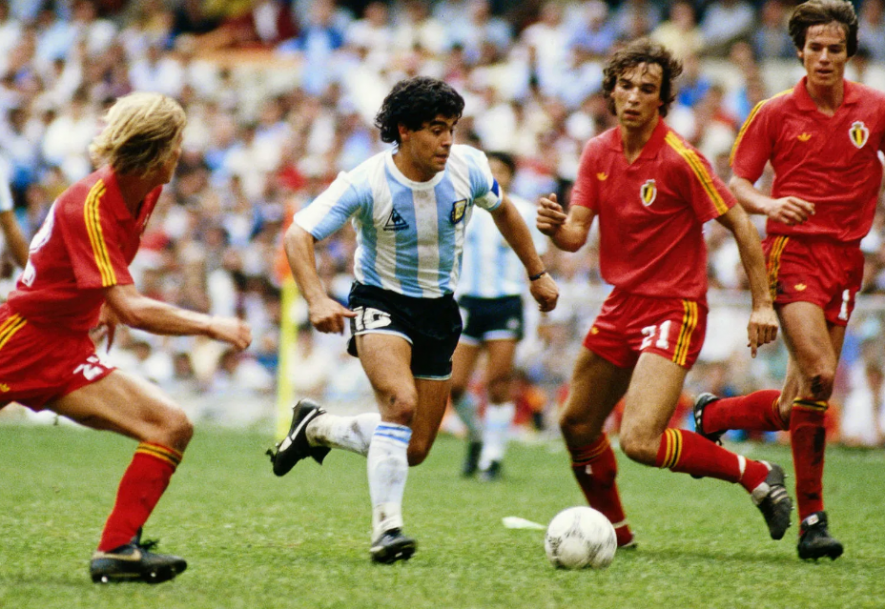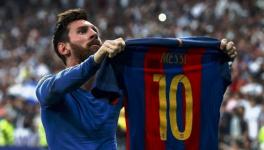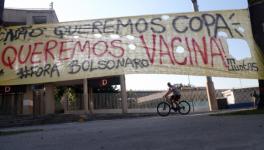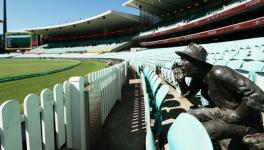Diego Maradona: Football legend Passes Away Aged 60

Diego Maradona was God personified on the football field. He used to operate in a different, Godly plane when in full flow, leaving defenders transfixed and overawed.
Diego Maradona, one of the greatest footballers of all time, died in his Buenos Aires home after suffering a heart attack. He was 60. Maradona had a successful surgery to treat a blood clot in the brain earlier in the month and was recuperating at home.
El Diego inspired Argentina to the 1986 World Cup, elevating himself to cult status across the world with his performances in Mexico which included arguably the greatest goal of all time and the infamous ‘Hand of God’, both coming in the quarterfinal against England.
The match, and the two contrasting goals -- one pure genius, and the other a pure guile -- can easily sum up the football legend’s life and career.
Also Read | A Chronicle Of Death In Sport. And Life
As skipper of Argentina in Mexico 1986, he displayed a level of skill, creativity, strength and desire never seen before or since. The impact his genius had on the pitch, and off it as well, was so clear that he used to be the star attraction when manager of Argentina at the 2010 World Cup in South Africa, despite the fact that the team had stars such as Lionel Messi.
Maradona was God, the rest all were mere mortals. Ask the English defenders of 1986 and they may nod in agreement. He used to operate in a different, Godly plane when in full flow. And that elevated him to the people’s hero at Naples, where he achieved everything that was to be won in club football with Napoli. He led the Italian side to a Serie A crown -- their first ever -- in the 1986-87 season. The club also won the Italian Cup the same year. A second Serie A title followed in 1990 and the UEFA Cup in ‘91. They have not won the league since.
The triumph is all the more special since Napoli, a small club, powered by Maradona challenged and broke the hegemony of northern Italy powerhouses Juventus, AC Milan and Inter.
Also Read | AIFF Approaches Supreme Court Seeking Extension of Tenure of Executive Committee
Maradona’s following was so big in Naples that during the Italy vs Argentina World Cup match in the city, the Italian fans, mostly citizens of Naples, chose to support Argentina and not the Azzurri. That match -- the semifinals of the World Cup -- ended 1-1 and Argentina progressed into the final with a 4-3 victory in the penalty shootout.
Maradona represented Argentina in four World Cups, scoring 34 international goals. In the 1986 World Cup, he scored five and had five assists as he enabled Argentina to the title.
Born in Buenos Aires October 30, 1960, Diego Armando Maradona was a child prodigy. At 10, he joined Los Cebollitas, the youth team of Argentinos Juniors and powered the junior side to a 136-game winning streak, which fast tracked him into the senior side before he turned 16.
Shortly after, Maradona made his debut for Argentina, as a substitute in a friendly against Hungary at La Bombonera, Boca Juniors’ stadium. Maradona joined Boca in 1981 for just one solitary season. That one year was enough for him to cement his legend at the club, scoring a stunning solo goal against arch rivals River Plate, and helping Boca win the title.
He left for Europe soon after and after an unsuccessful stint at Barcelona, he settled into Napoli and Naples, a city and club which he perhaps identified with, both as a player and person.
During the second half of his career, he struggled with cocaine addiction and was banned for 15 months after testing positive for the drug in 1991.
Maradona’s tryst with the tournament that defined him ended in ignominy though. He was captain of the national side at USA 1994, but was sent home after failing a drugs test for ephedrine. He played his final game for his country at the tournament.
He retired from professional football in 1997, on his 37th birthday, during his second stint at Boca.
Having briefly managed two sides in Argentina, Maradona was appointed head coach of the national team in 2008 and left after the 2010 World Cup, where his side were beaten by Germany in the quarterfinals.
He subsequently managed teams in the United Arab Emirates and Mexico and was in charge of Gimnasia y Esgrima in Argentina's top flight at the time of his death.
Get the latest reports & analysis with people's perspective on Protests, movements & deep analytical videos, discussions of the current affairs in your Telegram app. Subscribe to NewsClick's Telegram channel & get Real-Time updates on stories, as they get published on our website.
























